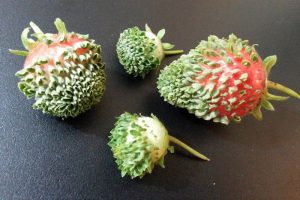Unusual food-related words
Each month, an unusual food-related word is added to this page.
Al dente |
Pasta or rice that has been cooked but is still firm when bitten. From Italian, literally mean ‘to the tooth’. |
Amuse-bouche |
A complementary bite-sized hors d’oeuvre. |
Astringency |
The dry, puckering or numbing mouthfeel caused by the tannins in unripe fruits and some ripe fruits. |
Balthazar |
An oversize wine bottle holding about 16 times the volume of a normal bottle. |
Bletting |
The softening of certain fleshy fruits, such as medlars and persimmons, beyond ripening, until the desired degree of sweetness/palatability is attained. |
Bonne bouche |
A tasty morsel, often something sweet eaten at the end of a meal. |
Borborygmus |
Intestinal rumbling caused by moving gas. Borborygmus is supposedly onomatopoeic – i.e. it sounds likes the thing that it describes. |
Chiffonade |
Shredded or finely cut vegetables or herbs used especially as a garnish. |
Crapulence |
Becoming sick because of gluttony (i.e. you have eaten or drunk too much). |
Fool |
A dessert made with pureed fruit mixed with whipped cream. |
Groak |
To stare silently at someone in the hope that they give you some of their food. This is something that my dog does whenever I am either eating or in the kitchen. |
La de la verguenza |
The last morsel of food on a serving plate that everyone is too embarrassed to reach out for. The literal meaning of the phrase in Spanish is ‘the one of shame’. |
Mageiricophobia |
Fear of cooking. According to Wikipedia, it can be related to any or all of fear of spreading illness, fear of the cooking process, fear of recipes, fear of food knowledge or fear of food intake. |
Molotov cocktail |
Any homemade, bottle-based incendiary weapon. In the Winter War between the Soviet Union and Finland (1939-1940), the Soviet foreign minister Vyacheslav Molotov declared that their bombing missions over Finland were actually airborne humanitarian food deliveries for their starving neighbours. As a result, the Finns sarcastically dubbed the bombs ‘Molotov bread baskets’. When they developed a hand-held bottle firebomb to attack Soviet tanks, the Finns called it the ‘Molotov cocktail’, as “a drink to go with his food parcels”. Read more. |
Omakase |
A Japanese term that translates to “I’ll leave it up to you”, meaning that you are turning your food choice over to the chef. According to Trevor Corson in The Zen of Fish (2007), the chef is expected to be innovative and surprising in selecting dishes, and the meal can be likened to an artistic performance. Omakase’s antonym (i.e. the opposite) is ‘okonomi’, meaning you will choose what to order. |
Oomancy |
The art of telling the future through the observation of eggs, especially the shapes formed when the separated whites from an egg are dropped into hot water. |
Orts |
Little bits of food left over from a meal. |
Plirding |
To pick up litter whilst bird watching. |
Sapid |
Something that has a strong, but pleasant, taste. |
Slumgullion |
A watery, inferior or insubstantial stew. |
Tines |
The prongs on a fork. |
Toothsome |
Of palatable flavour and pleasing texture. |
Turophile |
A lover of cheese. |
Tyromancy |
The art of telling the future through the observation of cheese, especially as it coagulates. Types of emerging mould and patterns of growing holes are apparently both important aspects. |
Vivipary |
 The phenomenon whereby seeds germinate while they are still inside, or attached to, the parent plant or fruit. Whilst it occurs as a matter of course in a few (but only a few) plants, in most plants it is usually the result of a hormone imbalance. The picture shows some viviparous strawberries. |
Yule-hole |
The last hole on a waist belt; in other words, the hole you have to move your belt buckle to after you’ve eaten Christmas dinner. It is apparently a Scottish word. |
